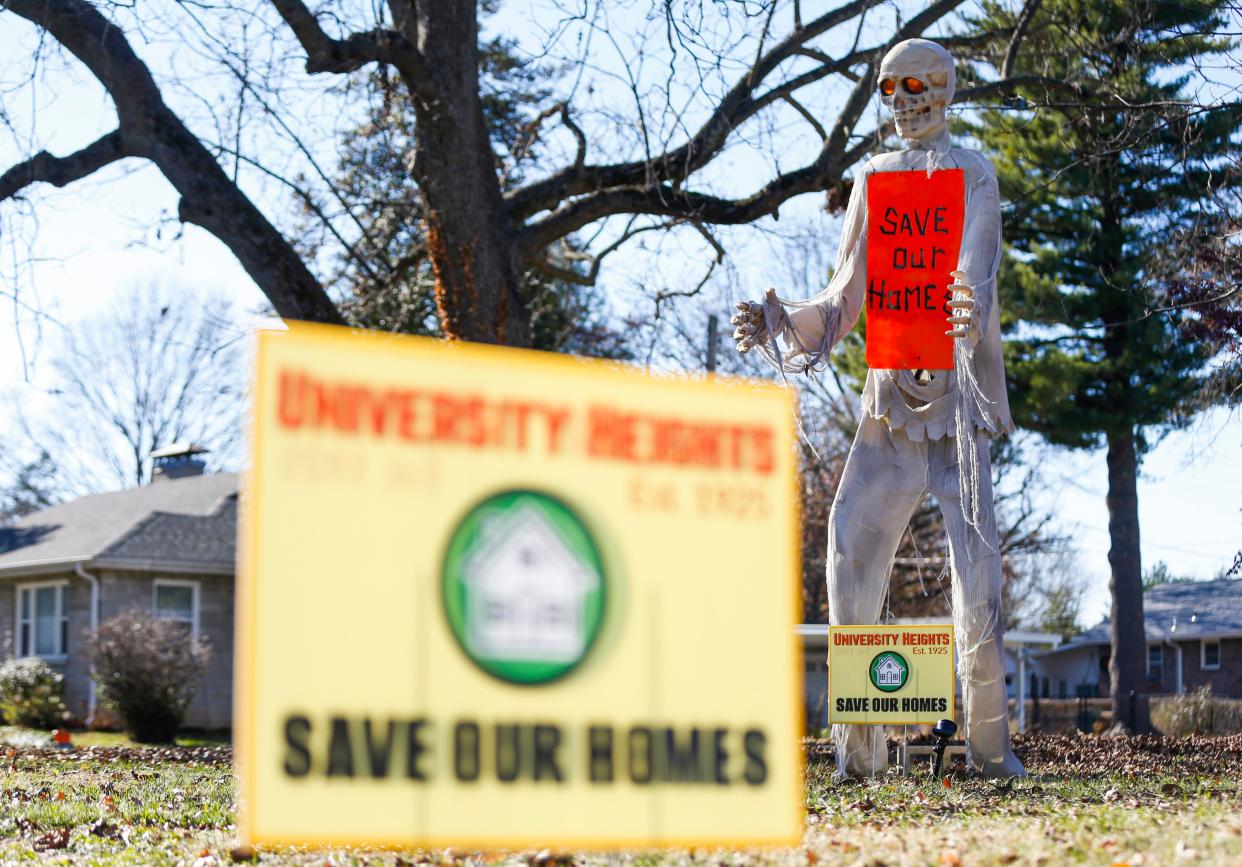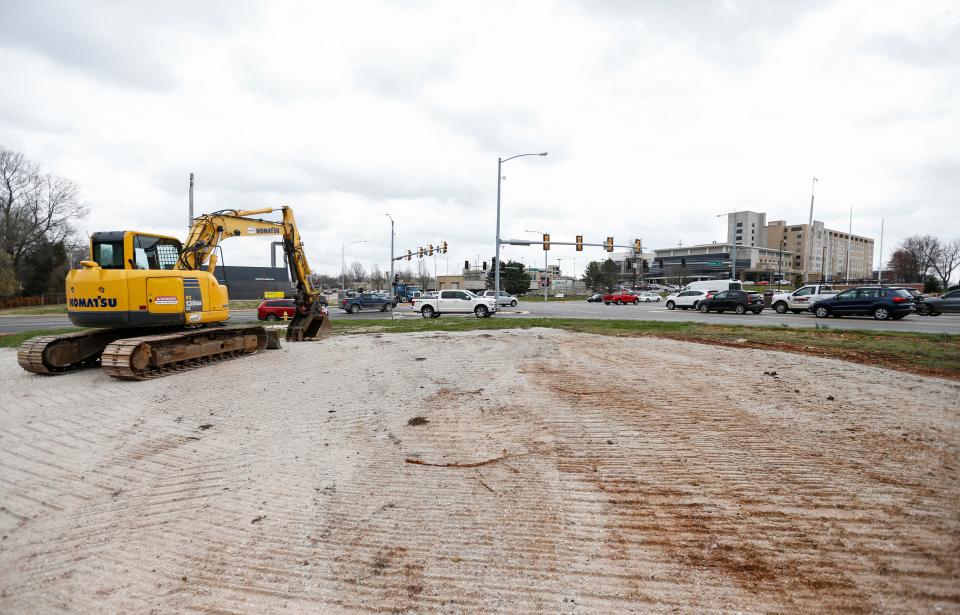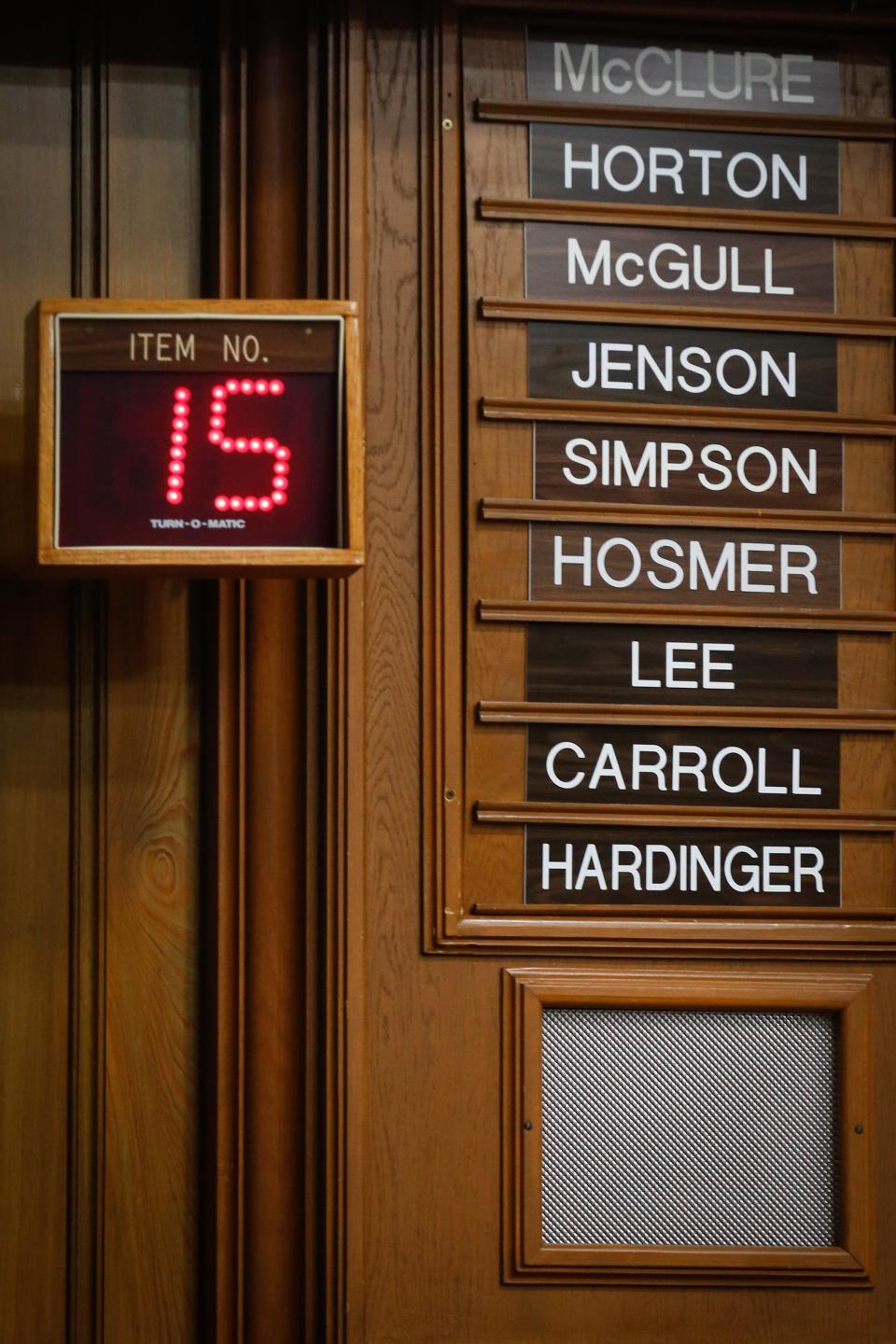City Council sends University Heights proposal back to P&Z, votes down moratorium

Springfield City Council narrowly shot down a proposed 210-day delay on all development near the Sunshine and National intersection on Monday. Supporters of the resolution argued it was needed to regain trust in Springfield's neighborhoods, while opponents argued the corridor plan developed during the administrative delay would take away from other city priorities.
Casting a shadow over the proceedings is the controversial development at the northwest corner of the intersection, which has yet to receive a formal hearing at City Council. If the development moratorium had been approved, it would not have affected current rezoning applications before the council, including "The Heights" development proposed by Be Kind & Merciful, LLC. However, applications for demolition or new construction related to the project could not have occurred during the delay.
Councilman Craig Hosmer originally proposed the delay in January and City Council opted to refer the issue to one of the body's committees for further study. That committee has not met since then, in part due to the April municipal elections and subsequent reshuffle of committee members. At the time, Hosmer described the move as a delaying tactic and had asked for the moratorium to come back for a vote before the full body.
"Moratoriums give the city a chance to catch up with development. This isn't something that's against development. This actually should be something that's favorable to both developers and to the neighborhoods because then you don't have these continuing fights that we get involved in ...," Hosmer said of the 210-day delay.
"(University Heights) is a neighborhood that's been in existence for 100 years. A hundred years in the city of Springfield. It's a neighborhood that doesn't have problems with crime. It's a beautiful neighborhood, beautiful houses, people take care of their property. Those are the kinds of neighborhoods we should be trying to replicate in the city of Springfield, not destroy."
More: University Heights development gets public hearing, but no vote, as P&Z commission delays
As part of the 210-day administrative delay, the city would have conducted a corridor study, which staff estimated would have required three months to hire a consultant and six months to conduct the study. They estimated the cost of the study would be between $45,000 and $55,000, which could either come from existing funds or Community Development Block Grants.
City Planning Director Susan Istenes at times appeared to struggle to answer Hosmer's questions Monday, but confirmed that staff do not support such a moratorium. The city is generally supportive of a corridor study for the intersection and surrounding area but hoped to first focus on drafting new zoning codes in accordance with the Forward SGF comprehensive plan adopted last year.
"Our stance has been that we've recently adopted our comprehensive plan and our next priority is implementing the plan through update of the zoning and subdivision regulations and that's what we're working towards" Istenes told Hosmer.
That sentiment was echoed by Councilman Matt Simpson, who argued the code revisions should be the city's priority.
"Our planning department is working on updates to our codes that in many cases have not been updated in several decades ...," he said. "We are not well served as a community because outdated codes and codes that don't align with public priorities expressed in the plan result in individual cases of conflict that don't benefit anyone, and they certainly don't benefit our community. "
Councilman Abe McGull forcefully argued that to implement a moratorium to largely impede a single zoning case while that case was in the city's rezoning process would be an "unconscionable" overstepping of due process.
"As a lawyer as well as an American citizen, every person is granted due process. We have a process in this city. We passed a comprehensive plan ..." he said, referring to Forward SGF. "Whenever a developer comes to the city with a development or a plan or whatever, they must follow that plan. That's part of the ordinances that we all agreed to and voted on. But in this country, we don't pick and choose winners and losers. We have a process"

McGull added he has "no feeling one way or another" concerning the National and Sunshine rezoning, but singling out the developers in this case would not be correct.
"It's unconscionable for me as an American citizen to tell a private citizen that purchased their land that you somehow don't have a right to get due process as everyone else."
Before the vote, several councilmembers urged developers at Be Kind & Merciful to reengage with the neighborhood and come to some compromise.
"We don't have everybody on the same page right now and there's been lots of miscommunication ... I will be supporting this moratorium. I think we need more time to make informed decisions," said Councilwoman Heather Hardinger.
The moratorium was voted down in a 4-5 vote. Councilmembers Hosmer, Horton, Hardinger and Jenson voted in favor of the administrative delay, while the rest of the council, including the mayor, voted against it.
Neighbors advocate for moratorium
A dozen residents of the affected neighborhoods spoke in support of the referendum.
Fifteen-year University Heights resident Eveyln Mangan said more meaningful neighborhood input "needs to occur."
"The neighborhood has been provided with no sense of security whatsoever about what the development may entail, and no basis upon which to undertake any meaningful discussion with either the city or the developer before historic homes are razed and a stable, well maintained historic neighborhood is decimated," Mangan said.
Speaking in his personal capacity as a Phelps Grove resident, Planning and Zoning commissioner Eric Pauly said he agrees other neighborhoods in worse shape need attention but it is the "development pressure" that "drives the need for this delay."
Phelps Gove neighborhood association president David Trippe also spoke in favor of the moratorium.
"We need to stop. We need to adopt Councilman Hosmer's recommendation for a moratorium, so city staff can communicate with potential developers and neighborhood representatives and then write policies that will provide a clear guideline for developers and a strong protection for residents of the neighborhood," Trippe said.
"The moratorium is actually pro-development. When the neighborhoods can sit down with future developers and city staff and can come up with a plan that benefits everyone involved, that's good development. Public policy shouldn't create enemies, it should create good neighbors. Let's take a breath and come up with a policy that will make Springfield proud."
More: Who is recused from University Heights vote? Mayor cites legal advice amid neighborhood pressure
Rezoning request back to Planning and Zoning
In addition to the administrative delay, council was originally set to debate the actual rezoning of Be Kind & Merciful's property at National and Sunshine, which currently is restricted to residential use. But late last week, the city announced developers asked council to remand the bill with changes back to the Planning and Zoning Commission, which previously rejected commercial zoning on the lots in a 1-7 vote.
According to a city press release, developers have made the following changes to their proposal, which they hope will change Planning and Zoning's mind:
Total height of any buildings are to be reduced from 75 feet to 55 feet, following 30-degree bulk plane;
A masonry wall will be built as opposed to a 6-foot-tall wooden fence along the perimeter abutting University Heights homes;
60 to 70 non-deciduous evergreens will be planted in the buffer yard, along the perimeter abutting University Heights Homes and neighborhood. Trees are to be planted every 8 to 10 feet apart and each tree to be a minimum of 12 feet tall when planted. An irrigation system will be installed as well to ensure maintenance, life and growth;
Trees will fill out to create a wall so University Heights will only see a wall of trees rather than development. In 3 to 5 years, these trees are anticipated to reach height of 20 to 25 feet tall.
Before hearing the case Monday, Councilman Simpson recused himself from the case because of an unrelated business connection between a developer and a family member. Mayor Ken McClure declined to recuse himself despite neighborhood pressure to do so, given his sister lives close by to the proposed development. He previously had recused himself from voting on another request in the area.
"I have a family member who owns property of University Heights neighborhood, I have no interest financial or otherwise, in the property," McClure said.

Before debate began on the bill itself, Councilman McGull motioned to remand the bill back to Planning and Zoning, per the developer's request.
Councilwoman Horton doubted the changes would make Planning and Zoning reconsider their vote, which was largely based on a lack of a site plan. Echoing McGull's previous comments, Hosmer said the remand should not be a part of due process.
"We talk about due process all the time. This is not due process when the developer can tell us what to do and we send it back and back and back until we get a Planning and Zoning Commission that finally gets tired of dealing with this and passes it. This isn't planning in the city of Springfield. This is letting developers tell us what we're going to do."
This article originally appeared on Springfield News-Leader: City Council sends University Heights proposal back to P&Z

